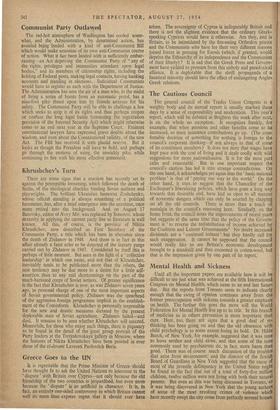The Cautious Council
The general council of the Trades Union Congress is a weighty body and its annual report is usually marked these days by a sense of responsibility and moderation. This year's report, which will be debated at Brighton the week after next, is on the whole no exception. It recognises frankly, for example, that when pensions and other benefits come to be increased, so must insurance contributions go up. (The com- fortable doctrine of something for nothing is foreign to the council's corporate thinking—if not always to that of soma of its constituent members.) It does not deny that wages have kept pace with the cost of living and it deals coolly with wild suggestions for more nationalisation. It is for the most part calm and reasonable. But in one important respect the council's caution has led it into strange contradictions. On the one hand, it acknowledges yet again that the basic national problem' is that of paying our way in the world.' On the other hand, it tries .,to suggest that the Chancellor of the Exchequer's liberalising policies, which have gone a long way towards that desirable end, have laid us open to all manner of economic dangers which can only be averted by clapping on all the old controls. There is more than a. touch of nostalgia in the council's reasoning here. Similarly, on the home front, the council notes the improvements of recent years but suggests at the same time that the policy of the Govern- ment is to reverse the redistribution of income achieved by the Coalition and Labour Governments' No doubt increased dividends are a continual irritant' but they hardly call for such exaggeration. It cannot be supposed that the council would really like to see Britain's economic development brought to a standstill and then cocooned in cotton-wool, but that is the impression given by one part of its report.


































 Previous page
Previous page